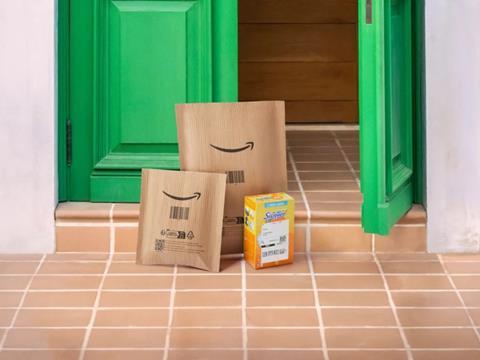
One in two of Amazon’s European shipments are delivered without box packaging through its reduction programme, the company reports, with over 50% said to come in reduced, recyclable delivery packaging like paper bags and cardboard envelopes, or no added packaging at all.
The Ships in Product Packaging programme applies to items that do not require additional packaging for delivery. Amazon ships the product in the manufacturer’s original packaging and only applies a customer address label.
In doing so, it hopes to create less waste to recycle, lightweight shipments, and cut down on emissions generated in transit. It claims that, since 2019, 700 million of its European shipments have been delivered with zero added packaging.
Paper bags and card envelopes are used for products that require extra packaging. These are said to be 90% lighter than corrugated cardboard boxes of a similar size, require less packaging material, and reduce the amount of empty space in each pack.
All the boxes, bags, and envelopes utilized by Amazon across Europe claim to be recyclable. Third-party sellers enrolled in the Fulfilment by Amazon programme are included in this figure, and they are now being incentivized to re-engineer their packaging and certify their products under the Ships in Product Packaging programme.
11% of all Amazon packages shipped worldwide in 2022 did not feature additional delivery packaging, the company reports. Its per-shipment packaging weight has apparently been reduce by an average of 41% since 2015, which is then said to translate to over 2 million tons of packaging materials avoided.
“Customers know Amazon for our instantly recognizable cardboard delivery boxes, but more than half of our deliveries in Europe now come in lighter packaging such as paper bags or card envelopes, or with no added packaging at all,” said Pat Lindner, VP of Mechatronics and Sustainable Packaging at Amazon. “We are committed to using machine learning and artificial intelligence to reduce packaging and be more sustainable for our customers, and the Operations Innovation Lab in Italy is at the forefront of those efforts.”
The Operations Innovation Lab – where Amazon tests its European packaging technologies – features such equipment as an automated machine that produces made-to-fit packaging, and a robot for automated label application to send out shipments without additional delivery packaging.
In an effort to keep minimizing its packaging, Amazon has been utilizing artificial intelligence (AI) and machine learning (ML) to recognize lightweighting and downsizing opportunities. Its Packaging Decision Engine, for example, is an AI model trained by data scientists to identify the most efficient packaging item from an item’s shape, durability, and other attributes.
Furthermore, it analyses customer feedback surrounding packaging performance to continue learning. Apparently, the model has helped Amazon cut down on its packaging use.
A new, home recyclable, paper-padded envelope is also being trialled across the continent. Made entirely from paper, the pack has reportedly been optimized for weight, flexibility, and impact resistance; it is thought to be lighter than cardboard envelopes and boxes, enable customers to easily fill the pack without wasting space, require less carbon in the manufacturing and transport processes, and absorb any stress put on a pack en route to the consumer, thus preventing damage.
Right-sized packaging is hoped to help Amazon optimize space in its delivery vans. In turn, this is set to cut down on the number of journeys needed to transport products and contribute to the company’s goal of achieving net-zero carbon emissions across its operations by 2040.
The news comes after Amazon worked with a range of SMEs to ship products in their original packaging, including Mum & You’s baby hygiene range, BUSHBABY’s mother-and-baby gift hampers, and bamboo paper, rolls, and wipes from The Cheeky Panda.
It came in response to research commissioned by Amazon, which suggested that 58% of respondents would approve of products arriving at their homes without delivery packaging to lower their environmental impact.
This year, the Amazon Sustainability Accelerator is looking for European climate-tech start-ups focused on building businesses in consumer products, circular economy, energy in buildings, and packaging. It intends to help entrepreneurs develop the skills and opportunities to grow their businesses without causing harm to the environment.
If you liked this story, you might also enjoy:
Report: The ultimate guide to global plastic sustainability regulation
The Brief: Oxo-(bio)degradables: the who, what, and why of breaking down fossil-based plastics
Sustainable Packaging Summit: How Kraft-Heinz uses collaboration to drive innovation
The Brief: Using ocean-bound plastic in packaging – how, why and should we?














No comments yet